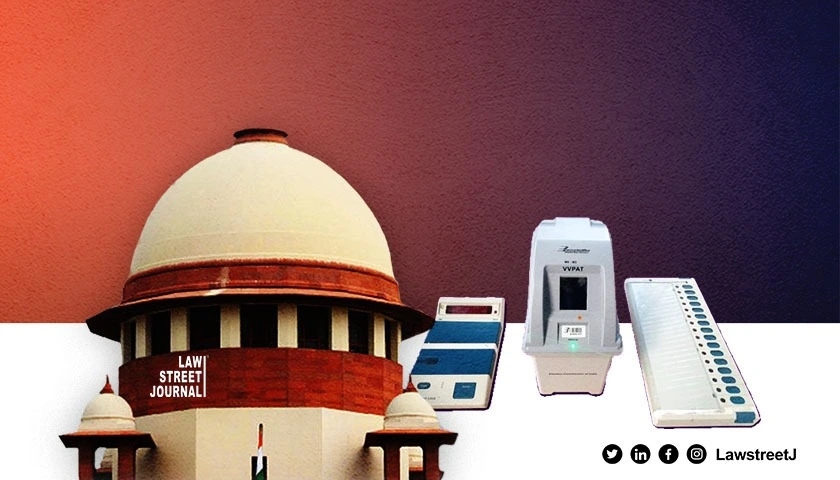NEW DELHI: In strong observations, the Supreme Court on Friday said in recent years, a trend has been fast developing of certain vested interest groups endeavouring to undermine the achievements and accomplishments of the nation, earned through the hard work and dedication of its sincere workforce.
Justice Dipankar Datta slammed NGO Association for Democratic Reforms for attempt to discredit the system of voting through the EVMs and thereby derail the electoral process, that is underway, by creating unnecessary doubts in the minds of the electorate.
The court, which declined to allow a plea for 100 % EVM-VVPAT counts in the elections, said blindly distrusting any aspect of the system can breed unwarranted scepticism and impede progress.
"There seems to be a concerted effort to discredit, diminish, and weaken the progress of this great nation on every possible frontier. Any such effort, or rather attempt, has to be nipped in the bud. No Constitutional court, far less this court, would allow such attempt to succeed as long as it (the court) has a say in the matter," Justice Datta said.
Also Read - Can't control elections or issue directions on suspicion: SC
The judge said he had serious doubt as regards the bona fides of the petitioning association when it sought a reversion to the old order of the paper ballot system.
"Irrespective of the fact that in the past efforts of the petitioning association in bringing about electoral reforms have borne fruit, the suggestion put forth appeared inexplicable. Question of reverting to the paper ballot system, on facts and in the circumstances, does not and cannot arise. It is only improvements in the EVMs or even a better system that people would look forward to in the ensuing years," he wrote in his separate judgment.
The judge noted the issue at hand of doubting the efficacy of the EVMs has been previously raised before this court and it is imperative that such issue is concluded definitively now.
Going forward, unless substantial evidence is presented against the EVMs, the current system will have to persist with enhancements. Regressive measures to revert to paper ballots or any alternative to the EVMs that does not adequately safeguard the interests of Indian citizens have to be eschewed, he said.
"Without any evidence of malice, arbitrariness, breach of law, or a genuine threat to invasion of rights, the writ petitions could have been dismissed as not maintainable. But, considering the seriousness of the concerns that the Court suo motu had expressed to which responses were received from the official of the ECI as well as its senior counsel, the necessity was felt to issue the twin directions in the greater public interest and to sub-serve the demands of justice," the court said.
Also Read - SC seeks clarifications from EC on EVMs
Justice Datta said while rational scepticism of the status quo is desirable in a healthy democracy, this court cannot allow the entire process of the underway General Elections to be called into question and upended on mere apprehension and speculation of the petitioners.
The petitioners have neither been able to demonstrate how the use of EVMs in elections violates the principle of free and fair elections; nor have they been able to establish a fundamental right to 100% VVPAT slips tallying with the votes cast, he added.
"Be it the citizens, the judiciary, the elected representatives, or even the electoral machinery, democracy is all about striving to build harmony and trust between all its pillars through open dialogue, transparency in processes, and continuous improvement of the system by active participation in democratic practices," he said.
"Our approach should be guided by evidence and reason to allow space for meaningful improvements. By nurturing a culture of trust and collaboration, we can strengthen the foundations of our democracy and ensure that the voices and choices of all citizens are valued and respected. With each pillar fortified, our democracy stands robust and resilient," Justice Datta added.

















